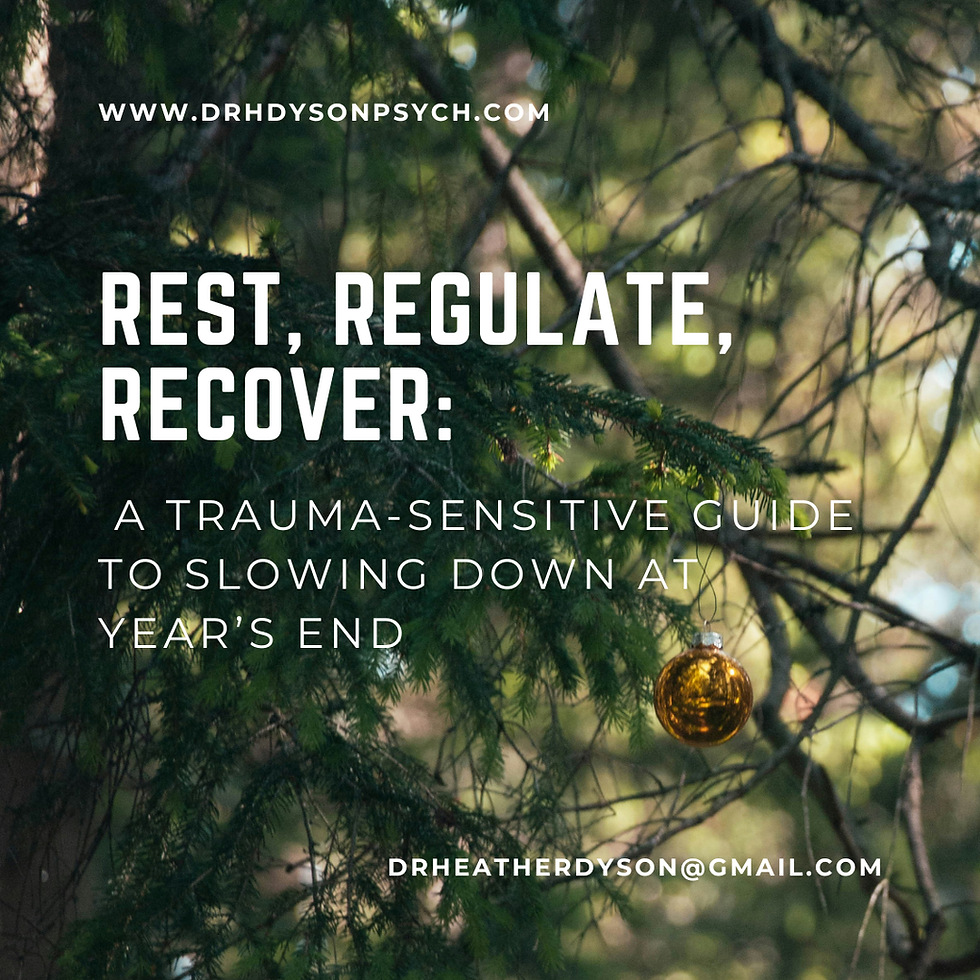Exploring the Impact of Childhood Trauma on Adult Relationships
- Dr Heather Dyson

- Jun 1, 2023
- 4 min read

Childhood is a formative period that shapes our development and influences our future relationships. Unfortunately, not all childhood experiences are positive, and many individuals face various forms of trauma during their early years. Childhood trauma can have long-lasting effects on an individual's emotional, psychological, and social well-being, including their ability to form and maintain healthy adult relationships. In this blog, we will delve into the impact of childhood trauma on adult relationships and explore the challenges faced by individuals who have experienced such trauma.
Understanding Childhood Trauma: Childhood trauma refers to experiences that are physically, emotionally, or mentally harmful, often occurring during crucial stages of development. These traumatic experiences can range from neglect, physical or sexual abuse, witnessing violence, or the loss of a loved one. Children are particularly vulnerable to the effects of trauma due to their limited coping mechanisms and lack of emotional maturity. The Impact on Adult Relationships:
1. Trust and Intimacy Issues: Childhood trauma can significantly impact an individual's ability to trust others. Experiences of betrayal or abuse can make it challenging to establish trust in future relationships. Fear of vulnerability and the potential for emotional harm can hinder the development of intimacy, leading to difficulties in forming deep connections with others.
2. Emotional Regulation: Trauma can disrupt the normal development of emotional regulation skills. Individuals who have experienced childhood trauma may struggle with managing their emotions, leading to emotional outbursts, difficulties expressing needs, or shutting down emotionally. These challenges can strain relationships, as their partners may struggle to understand or respond appropriately to their emotional needs.
3. Attachment Patterns: Attachment theory suggests that early relationships with caregivers shape an individual's attachment style, affecting how they relate to others in adulthood. Trauma can disrupt secure attachment, leading to insecure attachment styles such as avoidant, anxious, or disorganised attachment. These attachment patterns can impact adult relationships, resulting in difficulties with emotional closeness, fear of abandonment, or excessive need for reassurance.
4. Communication Difficulties: Effective communication is essential for healthy relationships. However, childhood trauma can impair an individual's ability to express themselves clearly and assertively. They may struggle with setting boundaries, expressing their needs, or effectively resolving conflicts, leading to misunderstandings and frustrations within relationships.
5. Patterns of Re-enactment: Unresolved trauma may manifest in unconscious patterns of re-enactment. Individuals may find themselves drawn to partners who replicate familiar dynamics from their past, even if these dynamics are unhealthy. For example, someone who experienced neglect as a child might unconsciously seek out partners who are emotionally unavailable. These patterns can perpetuate a cycle of trauma and negatively impact their relationships.
Healing and Recovery: While the impact of childhood trauma on adult relationships is significant, healing and recovery are possible. Here are some important steps individuals can take:
1. Seek Professional Help: Therapy, such as trauma-focused therapy or attachment-based therapy, can provide a safe space for individuals to process their trauma, develop coping strategies, and explore healthier relationship patterns.
2. Self-Awareness and Self-Care: Developing self-awareness is crucial in understanding the impact of childhood trauma on relationships. Engaging in self-care activities, such as exercise, mindfulness, and journaling, can support emotional healing and promote self-compassion.
3. Establishing Boundaries: Learning to set and enforce boundaries is essential for individuals who have experienced trauma. Communicating one's needs, limits, and expectations fosters healthier and more respectful relationships.
4. Building a Support Network: Surrounding oneself with supportive and understanding individuals can aid in the healing process. Participating in support groups or seeking connections with people who have had similar experiences can provide validation and a sense of belonging.
Childhood trauma can leave a profound impact on adult relationships. The wounds inflicted during those formative years can disrupt trust, intimacy, emotional regulation, attachment patterns, and communication skills. However, it is important to remember that individuals who have experienced childhood trauma are not defined by their past. With support, understanding, and a commitment to healing, they can overcome these challenges and form healthy, fulfilling relationships.
Healing from childhood trauma requires a multifaceted approach that may involve therapy, self-reflection, and support from loved ones. It is a journey that takes time, patience, and self-compassion. Through therapy, individuals can address the root causes of their trauma, develop coping mechanisms, and learn healthier relationship patterns.
Self-awareness is a vital aspect of the healing process. By gaining a deeper understanding of how their past experiences impact their present relationships, individuals can make conscious choices to break negative patterns and foster healthier connections. Establishing and enforcing boundaries is another crucial step, allowing individuals to protect themselves and communicate their needs effectively.
Building a support network is invaluable for those healing from childhood trauma. Seeking out support groups, connecting with understanding friends or family members, or engaging in online communities can provide a safe space for sharing experiences, receiving validation, and finding comfort in knowing they are not alone.
While the impact of childhood trauma on adult relationships is substantial, it is important to remember that healing and growth are possible. With the right support and a commitment to self-care, individuals can break free from the shackles of their past and cultivate healthy, fulfilling relationships based on trust, communication, and mutual respect.
Remember, if you or someone you know is struggling with the effects of childhood trauma, it is essential to reach out to mental health professionals who can provide guidance and support. Healing is a courageous and transformative journey, and everyone deserves the opportunity to build nurturing and loving relationships in their adult lives.
#attachment #trauma #psychology #psychologist #specialist #ptsd #cptsd #emotionalregulation #attachmentissues #therapy #recovery
Photo by Eye for Ebony on Unsplash




Comments